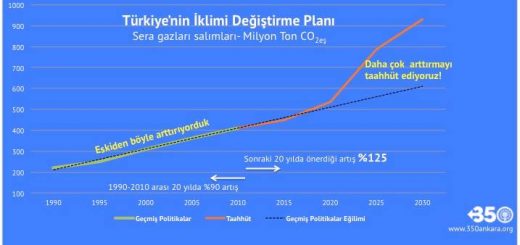Turkey Submitted “Climate-Changing” Plan
Member countries of the United Nations deliver their commitments to stop global climate change before a temperature increase of 20 C to the UNFCCC. Submitting its statement as the 131st country on Wednesday, Turkey has pledged to increase its greenhouse gas emissions by 2030 faster than before as its national contribution.
Turkey, which projects its greenhouse gas emissions at 1,175 million tons for 2030, has officially communicated that this figure will be reduced by 21% to 929 million tons, and that it will thus double in any case its greenhouse gas missions, which were 218 million tons in 1990 and 459 million tons in 2013.
Turkey clearly states in submitted INDC that existing high carbon economy policies will be strengthened. The plan does not pronounce any measures on fossil fuel consumption but other issues as stated below:
- Climate friendly energy solutions are being postponed and limited. The wind energy target of 20 GW for 2023 has been reduced to 16 GW and postponed until 2030 with the new plan. While there are solar energy applications near 10 GW, Turkey has announced the year 2030 as the target for 10 GW of solar energy.
- There is no adaptation to climate change, there are HEPPs instead. While nature is destroyed through HEPPs, Turkey has stated in the plan that it will use all of its hydroelectric potential.
- The climate plan includes nuclear energy. Turkey, which cannot find money for climate policies, has stated that one nuclear plant will be commissioned by 2030.
- Urban transformation, responsible for excessive concretization, is also in the climate plan. While existing and new buildings in Turkey are required to have energy identification certificates by 2017, Turkey has included this legal requirement as a new action in its policies for 2030.
- It asks for money to increase its greenhouse gases. Turkey has stated in the plan that it will also use the Green Climate Fund and all types of support to increase the emissions, which it increased by 90% between 1990 and 2010, further by 125% between 2010 and 2030.
- Turkey targets high carbon, not low carbon. While Brazil has given a reduction commitment of 43 % compared with 2005, and while Ethiopia has announced that it will emit less greenhouse gases in 2030 than in 2010, Turkey has shown by introducing no limits with regard to coal, petroleum and natural gas that it will change climate worse than in the past.
While infrastructure has collapsed in big cities such as Ankara and Istanbul as a result heavy rainfall in recent days, while flood disasters have just taken place in Hopa and Bodrum, and while 2014 is the second warmest year ever measured in Turkey, our country supports the new global climate agreement to be decided in Paris in December by changing climate!
For submitted INDC, click here.
Turkish version of the article, click here.










